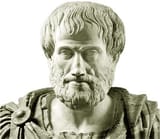>>24676675
nta. I reckon that critics (who can be placed among the mathematical construtivists, like Kronecker, who argue that all true mathematics has to be computable, and, as you say, 0.99.. is not computable) don't say that 0.999... is not equal to 1, they say that the question is not valid, because 0.999... is not a valid mathematical object.
However, I think that the idea can be understood just by saying that there can't be a real number contiguous to other (contiguity is the relationship between a shoe and the floor, they have extension in space and there is a clear limit between them where they touch each other), so if we endlessly add decimals (which is what constructivists don't accept), we have to imagine that we will get 1, because otherwise we would get a number just next to one with no continuous space in between, which is impossible. Essentially, both stances imply the same, namely, the absence of a contiguous real number to another, with the difference that on one side they negate the contiguity by equating both points and on the other they negate the contiguity by stopping and accepting that there will always be infinite points between the two.
For me it can be solved using the aristotelian frame of actuality and potentiality, which is already implicit in the mathematical definition of a limit. When mathematicians say that 1/x tends to infinity when x approaches infinity, they don't say that 1/x equals to infinity when x=0 (because the function is not defined at 0) but that the number will never stop increasing as we approach 0. So, extrapolating this notion to the 0.99... thing, we can say that it is potentially 1 but never actually 1, and in this context constructivists focus in actuality and intuitionists in potentiality, when in reality both are right and wrong at the same time for opposite reasons.
Maybe a professional mathematician comes to me and completely wrecks what I said with mathematical proof, but these are my layman intuitions based on the Aristotle's physics, which I encourage to read if you have a knack for math and in which he talks about infinity as a potentiality and approaches the continuum problem.
